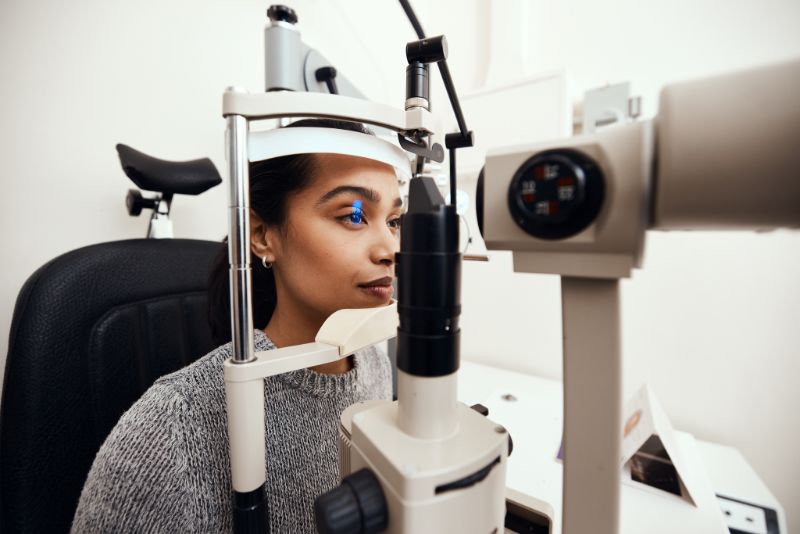
Routine and medical eye exams involve similar tests, such as refraction, dilatation, intraocular pressure, and personal examination. Ophthalmologists perform these eye exams.
However, a medical eye exam evaluates and treats medical conditions, while routine eye exams focus on eyeglasses or contact prescriptions.
At EyesNY, we offer patients routine eye exams to ensure their vision is optimal and medical eye exams to help them identify and treat any health concerns. Our experienced team of specialists offers caring and custom eye care.
Although similar, different types of eye exams target different needs. Our specialists will recommend the best option for your case during your consultation.
A routine eye exam is the most common type of evaluation. It focuses on identifying the state of your vision and measuring glass or contact prescriptions. Additionally, it may include an overall eye health evaluation to check for any potential medical issues.
While similar to a routine eye exam, a medical eye exam identifies medical issues that can’t be corrected with eyeglasses. Whether it's an eye condition or a sign of other health issues, your doctor will help you evaluate and recommend treatment during your medical eye exam.
Routine eye exams usually address vision impairment issues such as
These can be easily corrected with the proper refraction test and eyeglass prescription.
Often, eye problems may be a sign of other types of health concerns. During a medical eye exam, your doctor will help you identify these issues and determine treatment options. Some of the conditions that medical eye exams cover include:
During your eye exam, our specialists might ask about your medical or family history of eye diseases. Finding out about your lifestyle and family can help diagnose your eye condition.
Your Ophthalmologist will then assess your eyes' muscle function and dryness. Multiple tests may be performed, including:
During a regular eye exam, your doctor conducts a refraction to determine your prescription. This involves trying on different lenses and indicating which ones provide better vision.
Based on your responses, the most appropriate prescription for eyeglasses or contacts will be determined. Additionally, the regular eye exam includes an evaluation of the overall health of your eyes to check for any potential medical issues.
It is essential to detect eye diseases early to ensure timely treatment and preserve vision. According to the American Academy of Ophthalmology, a complete eye exam should be scheduled at 40, as early signs of eye diseases typically appear by this time.
Adults with eye diseases, diabetes, high blood pressure, or a family history of eye disease should see an eye doctor at least twice every six months. Children should have medical eye tests yearly.
As people age, the risk of eye disease increases, so it's important to adhere to scheduled check-ups. Seniors should have their eyes checked every one to two years once they turn 65, paying attention to age-related eye diseases like:
EyesNY offers routine and medical eye exams to help patients maintain optimal eye health and prevent vision diseases. Our specialized team of ophthalmologists is ready to assess your needs and give you the high-quality vision care you deserve.
We work with cutting-edge technology to identify the root cause of your condition and create personalized treatment plans. Our caring staff is ready to welcome you and meet your eye health and vision needs. We offer comprehensive eye care services, including routine and medical eye exams.
If you’d like a routine and medical eye exam, or more information, contact us, schedule an appointment online, or visit our clinics.
We have multiple locations around New York, including Malta, Clifton Park, Troy, Saratoga Springs, and Queensbury.
Malta
658 Malta Ave., Ste 101
Malta, NY 12020
Phone: (518) 580-0553
Saratoga Springs
414 Maple Ave Ste 200
Saratoga Springs, NY 12866
Phone: (518) 580-0553
Clifton Park
1712 U.S. 9
Clifton Park, NY 12065
Phone: (518) 580-0553
Queensbury
535 Bay Road
Queensbury, NY 12804
Phone: (518) 580-0553
Troy
2200 Burdett Street Ste 206
Troy, NY 12180
Phone: (518) 580-0553
